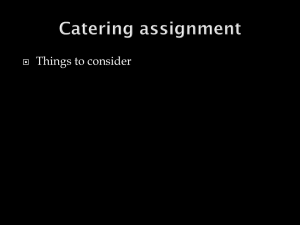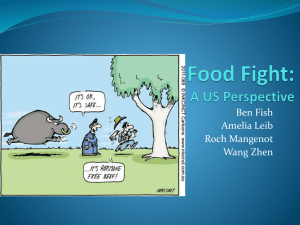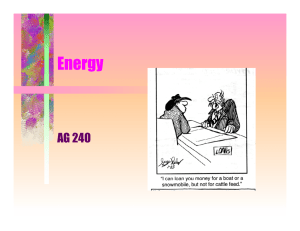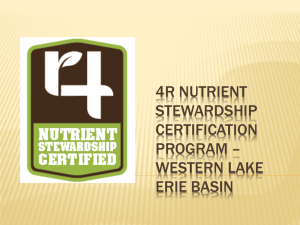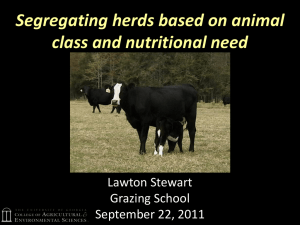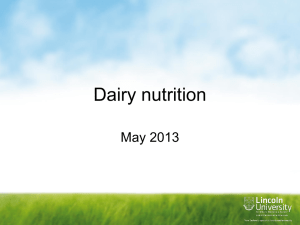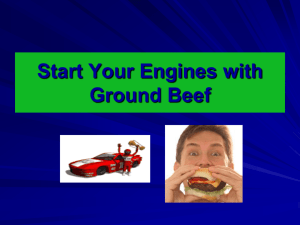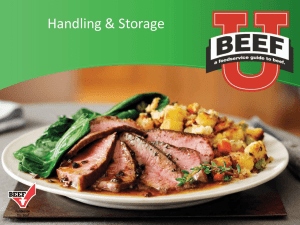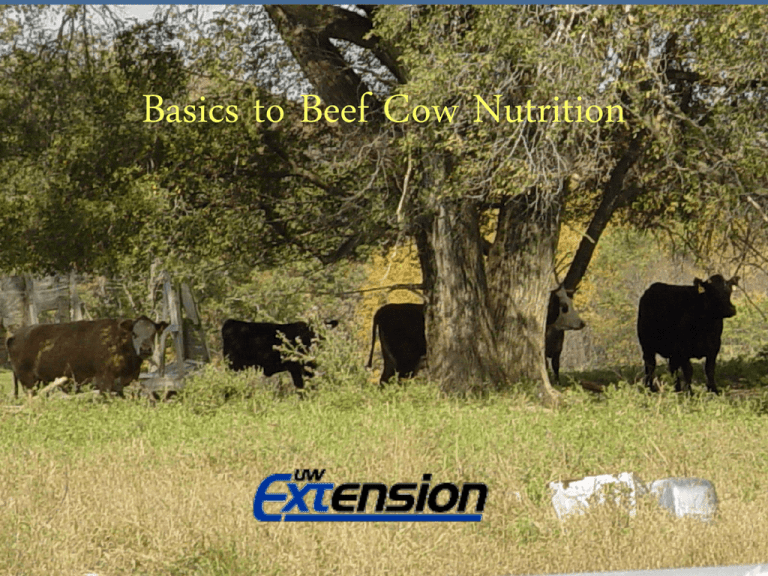
Basics to Beef Cow Nutrition
Basics to Small Farm Beef Cow
Nutrition
Adam Hady
Agriculture Agent
Richland County UWEX
Key Nutrients
Six Basic Nutrients
Water
Protein
Carbohydrates
Fats
Minerals
Vitamins
Nutrient Requirements
The amount of nutrient that an animal
needs to perform a specific purpose.
Determined by: weight, sex, age, growth
rate, stage of production.
Nutrient Composition
Nutrient composition is the amount of
nutrients found in the feed source.
Nutrient Composition can be obtained from
book values, which are just an averages
for a feed, or you can have a feed analysis
done.
Nutrient Composition
Common information on the composition
table for a feed stuff are:
Dry matter
Crude Protein
Energy
Fiber
Minerals
Feed Analysis
Dry Matter
The % of a feed stuff that is not water.
For example: If hay is 88% dry matter then
a 45 pound bale of hay would be 39.5 lbs
of dry matter.
Rations will come in as pounds of dry matter (DM) or As Fed
Crude Proteins
Proteins are the building block for animals
and are chains of amino acids
Crude protein is determined by the amount
of Nitrogen (N) in a feed multiplied by
6.25
N is used to determine the amount of protein, because
of the N is critical part of the amino acid structure and
makes up approximately 16% of the protein structure.
Crude Proteins
Crude Protein in beef cow rations come
primarily from the forage in the diet.
Pasture grass and forages are an excellent
source of protein
There are also many protein supplements
(feed that contain over 20% crude protein)
Energy
Energy is defined as the capacity to do
work.
In animal nutrition is determined by
biological heat production Calories (cal),
Kilocalorie (kcal), or Megacalorie (Mcal)
Energy
Common measurements of energy in ration
formulation
Gross Energy (GE) – total amount of energy in a feed
Digestible Energy (DE) – Energy absorbed by the
Metabolizable Energy (ME) – Energy that is available
source
animal after consumption
through feed consumption
Net Energy (NE) – Similar to DE and ME
Total Digestible Nutrients (TDN) – A method that
calculates energy based on crude protein and fiber.
Energy
Sources:
Starch, fats, cellulose and proteins
Majority of energy in beef cattle rations is the
cellulose in forage.
Fiber
Estimates the amount of carbohydrate found
in plants.
Unlike monogastrics, cattle utilize microbes
in the rumen to breakdown the fiber,
therefore providing energy to the animal.
Minerals and Vitamins
Minerals:
Two categories macro
and micro minerals
Crystalline substances
that can not be
synthesized in the
animal.
They provide the
foundations for
structure and function
in the animal
Minerals and Vitamins
Vitamins:
Two categories water soluble and fat soluble
Some vitamins can be synthesized in the body
others can not.
They provide the foundations for structure
and function in the animal
How Nutrients are Used
Maintenance
Lactation
Growth
Reproduction
In order of priority for the cow
TDN and CP
Diet Density Requirements for Beef Cows
1200 Mature Body Weight lbs & 20 lb Milk Peak
70
60
% of Dry Matter
50
40
TDN, %DM
CP, %DM
30
20
10
0
1
2
3
4
5
6
7
8
9
10
11
12
Months Since Calving
Source: NRC, 2000
Dry Matter Intakes
Dry Matter Intake
1200 Mature Body Weight lbs & 20 lb Milk Peak
29
28
Pounds of Dry Matter
27
26
25
24
23
22
21
1
2
3
4
5
6
7
8
9
10
11
12
Months Since Calving
Source: NRC, 2000
Nutrients by Calving Cycle
Nutrient Densitiy Requirements of Beef Cows
1200 Mature Body Weight lbs & 20 lb Milk Peak
70
Early Lactation
Late Lactation &
Early Gestation
Nonlactating &
Mid Gestation
Nonlactating &
Late Gestation
60
50
40
TDN, %DM
CP, %DM
DM, lbs
30
20
10
0
Apr.
may
June
July
Aug.
Sep.
Oct.
Nov.
Dec.
Jan.
Feb.
Mar.
Months Since Calving
Source: NRC, 2000
Adding Energy for the Elements
Rations of grain may be less effective than having
a sufficient supply of good quality forages such as
alfalfa or grass hay available at all times, since
fiber digestion produces body heat in cattle . If
animals are cleaning up everything quickly after
feeding and have nothing to munch on until the
next meal, you may not be putting enough forage
out at a time to meet their extra needs during cold
weather
Source: It’s Cold Outside
Does Only Hay Provide??
I am going to feed a Late Bloom Orchard
Grass Hay.
For the example Nutrients that we have
been using:
TDN – 54 %DM
CP – 8.4 %DM
Do We Meet Needs Just on Orchard
Grass Hay???
Nutrient Densitiy Requirements of Beef Cows
1200 Mature Body Weight lbs & 20 lb Milk Peak
70
Early Lactation
Late Lactation &
Early Gestation
Nonlactating &
Mid Gestation
Nonlactating &
Late Gestation
60
50
40
TDN, %DM
CP, %DM
CP Orchard Grass
30
TDN Orchard Grass
20
10
0
Apr.
may
June
July
Aug.
Sep.
Oct.
Months Since Calving
Nov.
Dec.
Jan.
Feb.
Mar.
Source: NRC, 2000
Pasture is a Gift
Nutrient Densitiy Requirements of Beef Cows
1200 Mature Body Weight lbs & 20 lb Milk Peak
80
Early Lactation
Late Lactation &
Early Gestation
Nonlactating &
Mid Gestation
Nonlactating &
Late Gestation
70
60
50
TDN, %DM
CP, %DM
CP Orchard Grass
40
TDN Orchard Grass
TDN Summer Pasture
CP Summer Pasture
30
20
10
0
Apr.
may
June
July
Aug.
Sep.
Oct.
Months Since Calving
Nov.
Dec.
Jan.
Feb.
Mar.
Source: NRC, 2000
Evaluating Your Feeding
Program
The best way to evaluate your feeding
program is by the animals themselves.
Use Body Condition Scoring as a guide.
Body Score Condition Scoring
How this will help my feeding program:
1.
2.
gives an indication of reproductive
perforce based on body condition
Can give you an estimate of nutrient
need.
Body Condition Scoring
Score of 1-9
Score of 1 – is Sick and Weak.
Score of 9 - Extremely Fat
Want a score of 6
When to Evaluate Body Score
Key times to look at body condition
scoring:
1.
Beginning of your breeding season
2.
At weaning
1.
Calving time
Sources & References
1.
2.
3.
4.
5.
Nutrient Requirements of Beef Cattle, National Research
Council, 2000
Livestock Feeds and Feeding, D.C. Church, 1991
UW- Extension Beef Web Page
http://www.uwex.edu/ces/animalscience/beef/index.cfm
Iowa Beef Center: http://www.iowabeefcenter.org/
Body Condition Scoring Beef Cows, Virginia Cooperative
Extension publication 400-795.
http://www.ext.vt.edu/pubs/beef/400-795/400-795.pdf
6.
“It’s Cold Outside! Tips for Winter Livestock Care” by , Rhonda Gildersleeve
Agriculture Agent Iowa County UW Extension from the Weekend Farmer
Newsletter
Questions ?????
Presenter INFO:
Adam Hady
Agriculture Agent
UWEX- Richland County
608/647-6148
adam.hady@ces.uwex.edu
Presenter INFO:
Adam Hady
Agriculture Agent
UWEX- Richland County
608/647-6148
adam.hady@ces.uwex.edu
Web site: http://Richland.uwex.edu
Click on Agriculture
01/07

